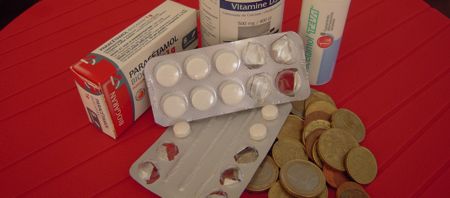Charges
Doctors or dentists who are ‘conventionnés’ (working within the French sickness insurance scheme) charge the official social security rates, now 23 euros per consultation. Some doctors have recently taken action and put their prices up to 25 euros, after a refusal by the government to raise the rate.
Specialists will charge more. You can check that a general practitioner is ’conventionné’ (working within this scheme) by consulting the local Caisse de Securité Sociale.
Some doctors are not ’conventionnés’ and charge an extra fee on top of the official rate. This is not reimbursable. They are the nearest equivalent to private practitioners in the UK. They must let you know in advance, or post their fees in their workplace.
Claiming your money back
If you do not have a *carte vitale
Unless you have a ’carte vitale’ *(see below for more details) you will need to pay in full up front when you visit the doctor, chemist, or any medical expert. If you need to go to hospital in France, you should make sure that you take with you your EHIC (if relevant), and evidence of UK residence (eg a driving licence or NHS medical card), just to be on the safe side.The EHIC entitles you to free or reduced-cost medical treatment that becomes necessary while you’re visiting an EEA country or Switzerland. Hospital treatment can be expensive, but most hospitals will take your details from the paperwork and bill you later if necessary, once your status has been verified. Remember that your EHIC does not cover all the cost.
To apply for reimbursement of medical expenses paid out, your doctor will give you a ’feuille de soins’ each time that you visit, which you should take to your local Caisse Primaire d’Assurance Maladie (CPAM) For residents of France, this has now being replaced everywhere by the *CARTE VITALE– a green card intended to improve the administration for reimbursement of medical expenses. Find out more about this below.
Prescriptions
If your doctor gives you a prescription, you should take the labels (vignettes) off the medicine containers and stick them on to your ’feuille de soin’which should also be sent/taken to the CPAM for reimbursement. The feuille de soins are used less and less today.
If you have a *carte vitale, this will not be necessary.
If you need hospital treatment, the Caisse de Sécurité Sociale will pay up to 80% of your charges directly, depending on your circumstances. You may not need to pay on the spot as long as you have the necessary forms ( E111, E106)
*What is a ’carte vitale’?
The carte vitale is a type of health card with microchip, similar in looks to a credit card and containing your personal details and all the information nececessary to prove your entitlement to the ’French health service’ IT IS NOT A CREDIT CARD AND CANNOT BE USED FOR PAYMENT OF YOUR MEDICAL FEES OR ANY OTHER PAYMENT.
When you present it to any medical expert, they will be able to bring up the data relating to your payment status. You will still need to pay for your treatment ’on the spot’ but will automatically receive, via the post, any monies due to be reinbursed to you (normally 70%). The carte vitale does NOT contain your medical details. It is purely adminstrative. If you are diagnosed with a ’chronic’ disease, you may well be taken on by the French medical system at 100%. This means that, on presentation of your carte vitale, the doctor will see that you have been accepted for reinbursement of all your fees. In this case, you will pay nothing ’on the spot’ or subsequently, as the doctor will be paid directly by the CPAM
A photograph and fingerprints may be required for the Carte Vitale and will take effect as individuals renew their cards. Some doctors, dentists etc are not yet computerised (or computer literate), and may still be using paper forms, despite your ’carte vitale’. If so, you must follow the procedure above and take the forms to the CPAM if you wish for reinbursement.
How can I find out if I am entitled to a carte vitale?
From January 2016, ALL permanent residents, who have lived in France for 3 months or more, can apply for a Carte Vitale. This includes both EU and non-EU citizens.
A new system, the ‘protection universelle maladie’ simplifies health insurance for foreigners in France. Whether you are unemployed, retired or pre retired, the PUM guarantees your right to reimbursement of around 70% of all your health costs. The other 30% will be covered by most good top-up or complementary insurance.



I have just received my medical cover in france. Can I claim back medical expenses for the past few months?
Don’t think so. Cover applies from date it was granted – but nothing to loose in trying. 🙂 Bonne chance